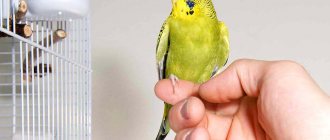It is a miracle to watch how parrots sleep, budgies in particular. After all, these birds are so fragile and delicate. Let's talk about the nuances associated with the duration of daytime and night sleep. Let's find out in what positions parrots prefer to sleep. Let's look at the benefits of rest and what the consequences are if the regime is violated. In conclusion, here are recommendations for creating comfortable sleeping conditions.
How long do parrots sleep in the wild and in captivity?
The owner is always worried at first when he sees that the bird sleeps up to ten hours a day. Then he reads special articles in the encyclopedia about the groundlessness of all anxiety.
In their historical homeland, birds live according to a special schedule. This is Australia - a very distant continent from our snowy lands. These colorful birds of paradise live in the tropical forests there.
Parrot sleep patterns in nature and at home
This is a hot country, the sun there is evil. It shines for a long time, and therefore the night turns out to be short. Parrots don't have time to sleep. They have a lot to do, they need to gain strength.
Even before the first rays, the birds wake up, put themselves in order, greet the rising star, and then do their main job - looking for food. After breakfast they fly to the water to drink.
And the sun, barely rising above the horizon, begins to become unbearably hot. Everyone is hiding in the dense crowns of tropical trees from the scorching heat. They have no choice but to sleep until the evening.
Having seen off the sun with cheerful chirps, they have dinner, chat and fall asleep again until dawn. So the day has passed! Even though there is no such heat in the northern hemisphere, and the forests around us are not similar to Australian ones, but our pets remember their ancient routine very well. The only difference is that here the parrot is resting in his cage.
Read also
How to treat a budgie for ticks at home
Other reasons
Improper environmental conditions affect a bird’s sleep no less than various diseases.
Sleeping pattern of a budgie. What you need to know?#Budgerigar#parrot#care and maintenance lessons
Not enough light
If your pet's cage is always in twilight, then it will be impossible for the bird to determine whether it is day or night. Lack of light reflexively entails a state of sleep or drowsiness.
Freezing
When the parrot is cold, it hides its head under its wing, using its plumage as a blanket. Even if the pet is awake, it creates the feeling of constant dozing. But the bird is just trying to keep warm.
Fear and stress
A frightened budgie will rush around the cage all night. Often the cause of this condition is sudden loud noises or too harsh and bright light. These birds are very shy, it is quite easy to cause this condition in them.
Corella Kesha is a tame parrot and sleeps like a cat. Loves to scratch. Dachshund in the frame.
Correct sleeping position
The peculiarity of sleeping while sitting on one leg is unique, except that only other species of birds can be compared with cute talkers. Many of them also settle down to take a nap on branches or on a perch.
Sleeping positions for parrots
Adult wavy cats and representatives of other breeds cling to this twig with only one paw. Even the herons have it easier, although they also press their other leg. They stand on the ground, the surface of which does not shake.
Parrots have amazing coordination! It doesn't appear right away. Young chicks sleep on two legs for a long time until they learn how to do it.
There is a second feature of the pose. Try not only balancing on one leg, but also placing your head on your back! Parrots can do it! This situation does not cause them any anxiety; they feel safe and comfortable. Often lovebirds sleep side by side, huddled closely, and one of them rests his head on the back of the other.
Sleep patterns at home
A good owner always knows whether his pet is getting enough sleep, because the bird’s mood depends on this. If he has had enough sleep, he is cheerful, feels good, willingly communicates with his household, causing them to be touched.
Parrot sleep schedule at home
If the bird has not rested enough, it gets bored - restlessness and even anxiety arises. It is incredibly difficult to control a ward, since the parrot's routine differs significantly from our routine.
But there is a way out! The cage should be covered. Or the owner can completely change his lifestyle, adapting to his pet.
How to create comfortable conditions for a feathered pet to rest?
I have already talked about how the sleep of little parrots is organized. Now let's talk about the big ones. For example, a cockatiel is quite large and strong, how can you please it? There is nothing to be afraid of.
Creating comfortable conditions for the parrot to rest
With proper care and sufficiently large space for living, this pet seems unpretentious. Breeds like this require space and freedom. It is better to give the bird the entire room at its disposal, but first remove dangerous objects from there.
In a cramped cage one cannot avoid depressed mood, apathy, and subsequently even muscle dystrophy. Corella does not want such a fate, and therefore may rebel and show aggression.
You need to be given the opportunity to hide or retreat somewhere, and if there is nowhere to hide from the apparent danger, the strong-billed flyer will certainly attack. This is his only defense in this situation.
Consequences of lack of sleep in parrots
And the more he worries about his safety, the less soundly he sleeps. And chronic lack of sleep threatens many health problems.
For example:
- shedding feathers in incredible quantities;
- furious self-plucking;
- lethargy, drowsiness;
- nervous behavior;
- aggression;
- depression;
- acquiring offspring contrary to the plans of the owner.
Possible complications
Your feathered pet doesn't care about the fact that you have an irregular sleep schedule. You can go to bed at any time you want, but your bird needs to get enough sleep.
Due to the lights not being turned off at night and extraneous noise (TV, music, guests talking), the parrot cannot sleep. For proper bird sleep, the room where the cage hangs should be dark and quiet. If the “wavy” does not get enough sleep at night, he will sleep during the day.
If you do not take care of your pet’s physical and mental condition and ignore its needs, then it is unlikely that it will be healthy, cheerful and active. Due to chronic lack of sleep, a budgerigar may develop the following problems:
- unnatural loss of feathers;
- self-plucking;
- constant drowsiness and lethargy;
- state of apathy;
- nervousness;
- depression;
- aggression;
- lack of appetite;
- unplanned egg laying.
In order for a budgerigar to get enough sleep, the duration of its sleep in the summer should reach ten to twelve hours, and in the winter - twelve to fourteen hours.
In order not to harm the health of your feathered pet, you need to provide him with optimal conditions for rest. The budgie begins to fall asleep when it gets dark. For proper sleep, at the appropriate time it is necessary to cover the bird’s cage with a breathable, dense fabric. Thanks to this, she will decide that it is time to sleep.
In the summer, when it gets dark outside the window, cover the cage around nine o'clock in the evening. Then your pet will sleep for the prescribed ten to twelve hours. In winter, you will have to put the bird to bed earlier - between five and seven hours. And she will be able to sleep for about twelve to fourteen hours.
Should the cage be covered at night?
Why is it necessary to cover a bird’s cage: myths and truth
A person must make a choice: whether it is necessary or not, whether to hide the bird or not. Many consider thick fabric a necessity - to protect the pet from drafts and from lamp light, which someone needs for work.
Should I cover my parrot's cage?
People are also looking for some convenience for themselves in this action: the parrot is aggressive, restless, screams early in the morning if there is no cape. In any case, he will have to be specially accustomed to such a blanket.
Poisoning
Signs of poisoning that appear indicate immediate first aid. Diarrhea causes severe dehydration. Therefore, at the first stage, adsorbent drugs are administered in liquid form using a syringe (without a needle) or a medical pipette.
Treatment should be based on the cause of poisoning. In certain cases, your parrot should be given a laxative to cleanse its digestive system. Replenishment of fluid in the body is performed by oral administration of Ringer's solution and glucose. The presence of acute poisoning requires immediate medical attention.
How do supporters of a positive solution explain their position?
- Compliance with daylight rules.
- Preventing unexpected egg laying.
- Normalization of hormonal balance.
Read also
How to determine the age of a budgerigar
There are arguments that the bird’s sleep and wakefulness patterns can be instilled according to one’s own calculations, ignoring their natural predisposition to a much more complex routine. This can also contribute to success in taming the noisy troublemaker and subordinating it to its owner. To put it mildly, it will increase discipline.
What and how is correct?
The fabric chosen is dark, not very dense. In front it should not fall to the base of the cage; on the sides there should be complete darkness. One wall is always open, otherwise the bird will suffocate. The deprivation of light must be gradual.
Choosing the right fabric
First, place the blanket only on top and turn off the large lamps. Leave a table lamp or night light. Let your pet realize that it is twilight for him.
When this happens, he will calm down. At this time, it would be good to have a heart-to-heart talk with him - quietly and affectionately. When he sits on his perch, you can cover the cage as expected.
Why does a budgie sleep all day: incompatibility with the breeder's regime
For a parrot to feel great, it needs to get enough sleep. Therefore, you need to periodically check how much the parrot sleeps and eats.
Another thing is that difficulties may arise here, because the human regime often does not coincide with the bird’s regime. In this case, in order not to harm your pet with insomnia, you can use a blanket. When you cover the cage with it, the parrot begins to doze. He associates darkness with rest and sleep, but the fabric of the bedspread should be thin and breathable.
Possible sleep disorders and how to deal with them
Problems with daytime sleep
During the day, parrots almost always rest, especially after eating, this gives them strength. There is no reason to worry. But if the bird sleeps for a long time at night, and does not have fun during the day, constantly nods, or loses its appetite, observation is required.
Problems with your parrot's naps
This happens during seasonal molting. Its signs are easy to notice - the bottom of the cage is covered with fluff. This will pass. When the underlying cause of daytime sleepiness cannot be determined, you should contact your veterinarian.
Cold
The respiratory system of a parrot is special. Therefore, drafts and sudden changes in temperature have a negative effect on the body.
Symptoms:
- loss of activity (the bird practically does not tweet);
- increased drowsiness;
- ruffled appearance;
- rapid breathing, sometimes accompanied by twitching of the tail to the beat;
- refusal to drink and eat;
- inflammation of the mucous membrane, the appearance of discharge from the sinuses.
Often a cold leads to pneumonia. Wheezing and wheezing appear. To identify signs, you should carefully take the bird in your hand (preferably in a dark place, this will eliminate the appearance of stress and random movement around the cage), using a phonendoscope, listen to the work of the lungs as you inhale and exhale. Diagnosis is carried out for the presence of extraneous sounds. If you don’t have such a medical device, you can put your ear to the surface of your pet’s back.
Night sleep disorders
It's a bad sign if the parrot doesn't sleep after dark. He probably complains, making loud and incomprehensible sounds. He doesn’t sit still, he rushes about. First of all, you need to carefully examine the bird for any injuries.
She could fall from the perch in her sleep, losing her balance, and hurt herself. If a wound is found, it is treated in the same way as a child’s – with hydrogen peroxide, for example. But there may be a turning point. In the morning, it is advisable to show your pet to a doctor.
Most often, sleep is disturbed by fear. What alarmed the bird? Yes, anything, even a shadow running along the wall from the headlights of a passing car. It is necessary to create conditions for rest - silence, darkness, and a miracle will happen - the troublemaker will fall asleep.
How parrots sleep. Shurik is sleeping.
There may be other reasons for his concern. Diseases of internal organs. Parasites, finally. An ornithologist will definitely find out the truth if you contact him.
Deviations from the norm
Sleep during the day
It was previously mentioned that budgies like to rest during the day. So don't worry if your pet sleeps during the daytime. The bird probably had a hearty meal recently. Or she got bored and therefore fell asleep.
If your budgie sleeps a lot at night and at the same time tends to sleep during the day, then this is a cause for concern. In this situation, you should carefully monitor your pet. Poor appetite (or refusal to eat) and a cage tray strewn with fluff most likely indicate the beginning of seasonal molting. Read about what molting is and how to act during molting here.
A sloppy appearance, nausea, and problems with bowel movements may be signs of poisoning or the initial stage of a serious illness. In such a situation, the best solution is to consult a veterinarian.
Sleep at night
It’s bad if the room is quiet and dark, it’s night outside, and the bird is not sleeping. At the same time, she can even fly in a cage and make strange sounds. There are several reasons why budgies do not sleep at night:
- bruise (fracture);
- fear of something;
- parasites.
If this happens to your feathered pet, inspect it carefully. Check to see if he is hurt or has a fracture. Maybe he fell from a perch or something and got hurt. In such a situation, disinfect the wound. In case of a fracture, a splint must be applied.
The second possible situation: there are no wounds on the parrot’s body. At the same time, he continues to behave restlessly and does not fall asleep. Then perhaps the bird is afraid of something. Budgerigars can become frightened under a variety of circumstances. The cause of fear may be banal shadows on indoor objects, or other pets. It is advised to close doors in rooms where budgies sleep. Then, most likely, no one and nothing will be able to disturb their peace.
If the bird still continues to fuss and squeak, then it may have parasites. Seek advice from specialists. Ask them to examine your pet. Tell them about your concerns about your pet's health and behavior. Especially if you yourself could not understand what is bothering your bird and how to help it.











